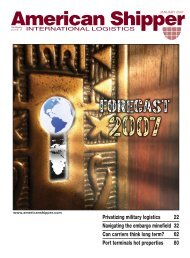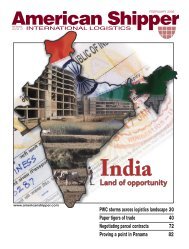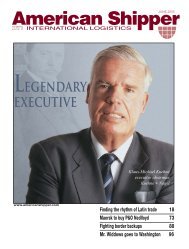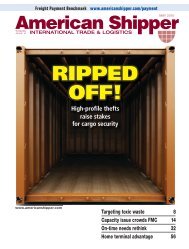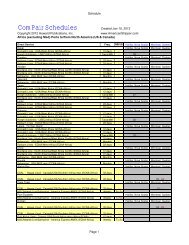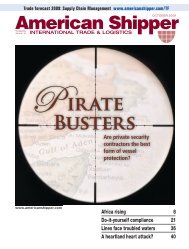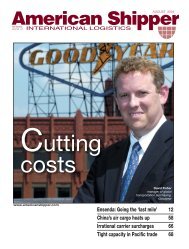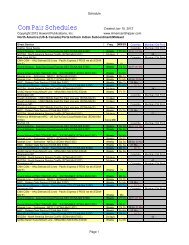McLean's - American Shipper
McLean's - American Shipper
McLean's - American Shipper
- No tags were found...
You also want an ePaper? Increase the reach of your titles
YUMPU automatically turns print PDFs into web optimized ePapers that Google loves.
Cargo liability after English Channel collisionEarly on Dec. 14, 2002, three vessels — the Kariba,Tricolor and Clary — were navigating in a traffic separationpattern in the English Channel north of Dunkerque,France. The ships were operating in restricted visibilitydue to fog. The Kariba and Tricolor were on roughlyparallel courses in the westbound lane of the traffic pattern.At 2:05 a.m., both vessels had just made a turn atthe Fairy South buoy and were navigating from way-pointto way-point in their planned courses. At this same time,the Clary, a bulk carrier registered in Singapore, was alsoproceeding on a steady course in the northbound lane ofan intersecting branch of the traffic separation pattern.Tricolor, a roll-on/roll-off car carrier loaded with 3,000luxury vehicles, was in the process of overtaking Kariba— a Bahamas-flagged containership.When the Kariba and Clary were about three milesapart on intersecting courses, the Kariba made an abruptturn to starboard (right) and hit the port (left) side of theTricolor, causing the Tricolor to capsize and sink alongwith her entire cargo — valued at about $180 million.There were no human casualties, the crew of the Tricolorhaving made it safely on board the Kariba.During subsequent litigation in a New York federalcourt, legal representatives for the Kariba argued that ithad been boxed in by the Clary and Tricolor, and that thosevessels were at least partly to blame for the collision.“There is no dispute that it was the duty of the Clary,as the vessel intersecting the westbound traffic separationscheme, to turn to starboard and go safely astern of theKariba and the Tricolor, and that is what the Clary did,but allegedly later than it should have and not before theKariba turned to starboard and put itself on a collisioncourse with the Tricolor,” U.S. District Judge HaroldBaer Jr. said in his ruling.The court noted further that the master of the Karibahad misread his Automatic Radar Plotting Aid (ARPA)and believed that the Clary was closer than it was.Attorneys for the Kariba, according to Baer’s ruling,“made much of the fact that the Clary did not stay behindto help with the wreck and rescue the crew of theTricolor, but instead went on its intended course to theNetherlands.” The second officer of the Clary claimedhe did not understand the severity of the collision, andthought that the ships had merely “kissed.” “While hisactions after the collision may be indefensible and evenreprehensible, they appear to have no bearing on ourinquiry — which is to determine who was responsiblefor the collision,” Baer wrote in his ruling.“At first, the court was surprised that none of the shipscontacted one another via VHF radio to inquire whichone was to take evasive action, but testimony indicatedthat use of the VHF radio was discouraged because it wastoo difficult to identify which vessel was which becauseof there being so many ships in the traffic separationscheme,” the judge noted.The liability of the three vessels “for the claims beforethis court is to be determined in accordance with Article4 of the Brussels Collision Convention of 1910,” Baerdetermined. That article says, in part, that “if two ormore vessels are in fault, the liability of each vessel shallbe in proportion to the degree of the faults respectivelycommitted.”After assessing the evidence, the court noted that “inorder to be boxed in, there must be four sides closed.” Inthe event at hand, “one side of the box was always open,92 AMERICAN SHIPPER: APRIL 2006because at any time the Kariba could have simply cuther motor and slowed down.”Baer ruled, “the cause of the collision was the sole andexclusive fault of the Kariba. The Tricolor and Claryshare no portion of liability for the collision.”[Otal Investments, as owner of the Kariba, v. Wilh. WilhelmsenASA, et al., v. Zurich Insurance Co. v. Tricolor,et al.; U.S. District Court for the Southern District ofNew York; Docket numbers 03 Civ. 4304, 03 Civ. 9962,04 Civ. 1107; Date of ruling: Jan. 4]Jones Act proviso means what it saysHorizon Lines LLC, a U.S.-flag carrier active in theJones Act trades, sued in federal court to thwart approvalby U.S. Customs and Border Protection of a planby Sunmar Shipping Inc., a competitor of Horizon’s,to transport frozen fish from Dutch Harbor, Alaska,to Boston.Sunmar had received CBP approval to charter non-Jones Act vessels to bring fish from Alaska to Bayside,New Brunswick, a port about six miles south of St.Stephen, New Brunswick, which is across the St. CroixRiver from the Calais, Maine, point of entry to theUnited States.Rather than proceed directly to Calais, Sunmar proposedto move the fish in a triangular pattern, first bytruck and then by rail, to several towns in New Brunswick,adding 145 miles to the route prior to entry intothe United States. Sunmar did not intend to file ratetariffs for any portion of the route.Although the Jones Act generally prohibits transportof goods in the coastwise trade from one U.S. port toanother except on U.S.-flag vessels, an exception inthe act’s third proviso allows shipments on routes usingCanadian ports and railroads when such routes arerecognized by the Surface Transportation Board andrate tariffs have been filed with the STB.CBP, in approving Sunmar’s plans, had noted thatsubsequent to the enactment of the Jones Act’s third proviso,Congress had largely deregulated the rail industryand virtually eliminated required filings of tariffs. CBPthus reasoned that the rate tariff-filing requirement ofthe third proviso should be ignored, on grounds that“mechanistic adherence” to statutes requiring the filingof rate tariffs with the STB “in the present climate ofderegulation would lead to an absurd result that cannotbe justified.”At trial, Horizon Lines argued that Sunmar’s proposedroute was “commercially pointless” and in violation ofthe Jones Act’s third proviso.U.S. District Judge Ellen Segal Huvelle ruled thatCBP had gone too far in expanding the third provisoof the Jones Act. “This interpretation ignores both theplain language of the (Jones Act) and the congressionalintent in enacting it,” Huvelle determined.CBP’s rulings were “arbitrary, capricious and not inaccordance with law,” the judge said.Huvelle ordered that the case be sent back to CBP“for further proceedings not inconsistent with this …opinion,” meaning that the third proviso of the Jones Act[The Merchant Marine Act of 1920, 46 U.S.C. app. 883(codified as amended, 2004)] must be read literally.[Horizon Lines LLC, v. the United States of America and<strong>American</strong> Seafoods Co. LLC.; U.S. District Court forthe District of Columbia, Docket number Civ. 05-0952(ESH). Date of ruling: Feb. 10.]



